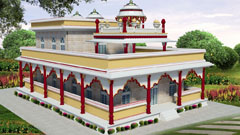
|
Jain SanghThe Jain Order is known as the Jain Sangh. Each Tirthankara revitalizes the Jain order. The current Jain Sangh was re-established by Lord Mahaveera, who was the 24th and the last Tirthankar of the current time period. The Jain Sangh is composed of the following four groups:
Lord Mahaveera's teachings were carried on by his ganadharas to us in the form of scriptures (Agams). They were compiled into twelve separate parts, known as the dwadashangi (twelve parts). These twelve compositions were acceptable to all followers. However, the dwadashangi were not put in writing for a long time. The Jain pupils learned them by memorizing them. About 150 years after the nirvana of Lord Mahaveera, there was a drought for 12 years. During this time, some monks along with Bhadrabahuswami migrated to South. After the drought was over, some monks came back to North. They observed that there was some inconsistency in oral recollection of the Jain scriptures by different monks. That made them to compile scriptures. To accomplish that, the first council (conference) of monks was held in Patliputra about 160 years after Lord Mahaveera’s nirvana. Monk Bhadrabahu, who had the knowledge of all 12 Angas, could not be present at that meeting. The rest of the monks could compile only the first eleven Angas by recollection and thus, the twelfth Anga was lost. The monks from the South did not agree with this compilation, and the first split in Jainism started. Jains are divided into two main groups: Swetambaras - The word Swetamabar is formed from two Sanskrit Words: 'Sweta' meaning white and 'Ambar' meaning clothes. So the complete word says 'a person whose clothes are white". Swetambar monks wear white clothes.
|






















